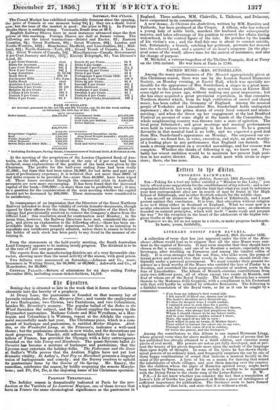LITERARY GOSSIP PROM BAVARIA.
_Munich, 20th December 1856. A collection of verse that has just appeared under the title of the Man- chener Album would lead us to suppose that all the nine Muses were resi- dent in the capital of Bavaria. It may seem singular that they should have chosen so flat a country, and one of so Boeotian a nature, especially in its beverages, after dwelling on Parnassus and among the virufen colles of Italy. It is even stranger that the sad Nine, who alike scorn the pomp of tyrant power and coward vice that revels in its chains, should dwell con- tentedly under a paternal government. We must consider their present re- sidence as a freak worthy of the Muses who confided the lyre of Pinder to a Bceetian, and nourished the most gorgeous colourist of modern poets in the hue of Lincolnshire. The Album of Munich contains contributions from sixty-two different poets, all of whom except two reside in Munich, and four of whom are of the Royal Family. The King of Bavaria has a sonnet therein to the Madonna della Geggiola, with a compliment to his Protestant wife that will hardly be relished by orthodox Romanists. The following is a faithful translation of the Royal verse, as far as it can be caught by a commoner.
" E'en from my infancy's first vernal tide I felt myself, 0 Blest one, drawn tow'rd thee. The heart's devotion ne'er deceived me, To thee its deepest woes I could confide. I ventured once to seek thee for a guide, And, full of wonted confidence, Heaven's Queen, Asked thee, who always had propitious been, Whom I should choose to be my future bride. And in your features sudden seemed I there, Mary, the angel of my life to view:
Thou willed to join us twain, 0 Mother blest;
Thou willed to intrust the sweet one to my care, Through her the curse of evil to subdue,
Of wives the purest, and the lovingest."
Among the contributors to this Album is one named Hermann Lingg,
whose general verse rises far above mediocrity. A volume of poems that he has published has already attained to a third edition, and contains many pieces of real merit. His powers are not as yet fully developed, and at pre- sent the beauty of his pieces depends more upon the melody of the language than upon depth of thought. In some of his lyrics he has shown rhyth- mical powers of no ordinary kind, and frequently surprises the ear by one of those happy combinations of sound that indicate a musical faculty in the
mind of the producer. A lyric of his on a mania for dancing that seized
the inhabitants of whole villages, and sent them dancing over the country like the children whom the piper of Hamelen spirited away, might have been written by Tennyson, and for its melody is worthy to be mentioned with the Dying Swan or the chorie song of the Lotus-Eaters. E. W. do not know whether you consider the fact that a translation of Lewes's Life of Goethe has just appeared at Berlin a piece of intelligence of sufficient importance for publication. The Germans seem to have formed a high estimate of that book, and state that it is without a rival.


























 Previous page
Previous page